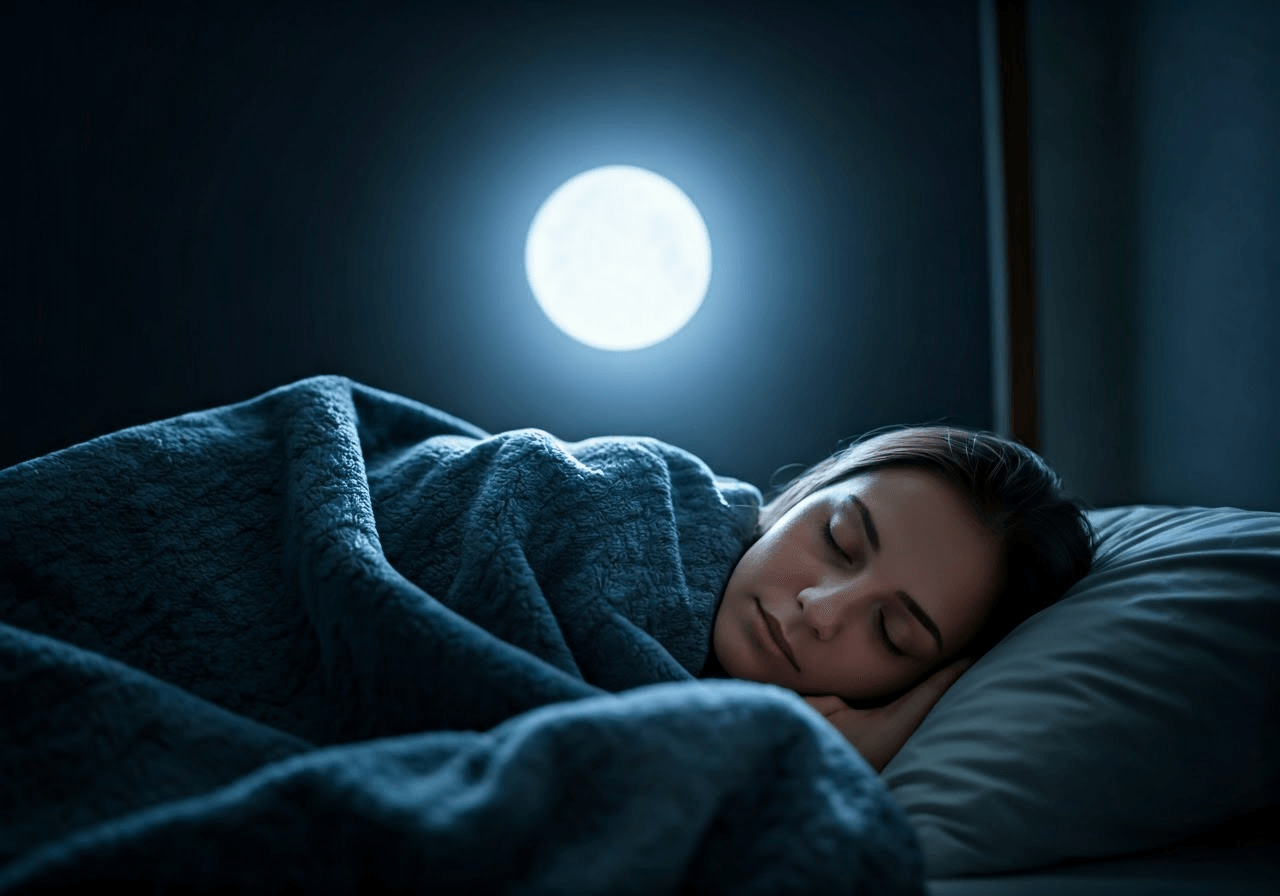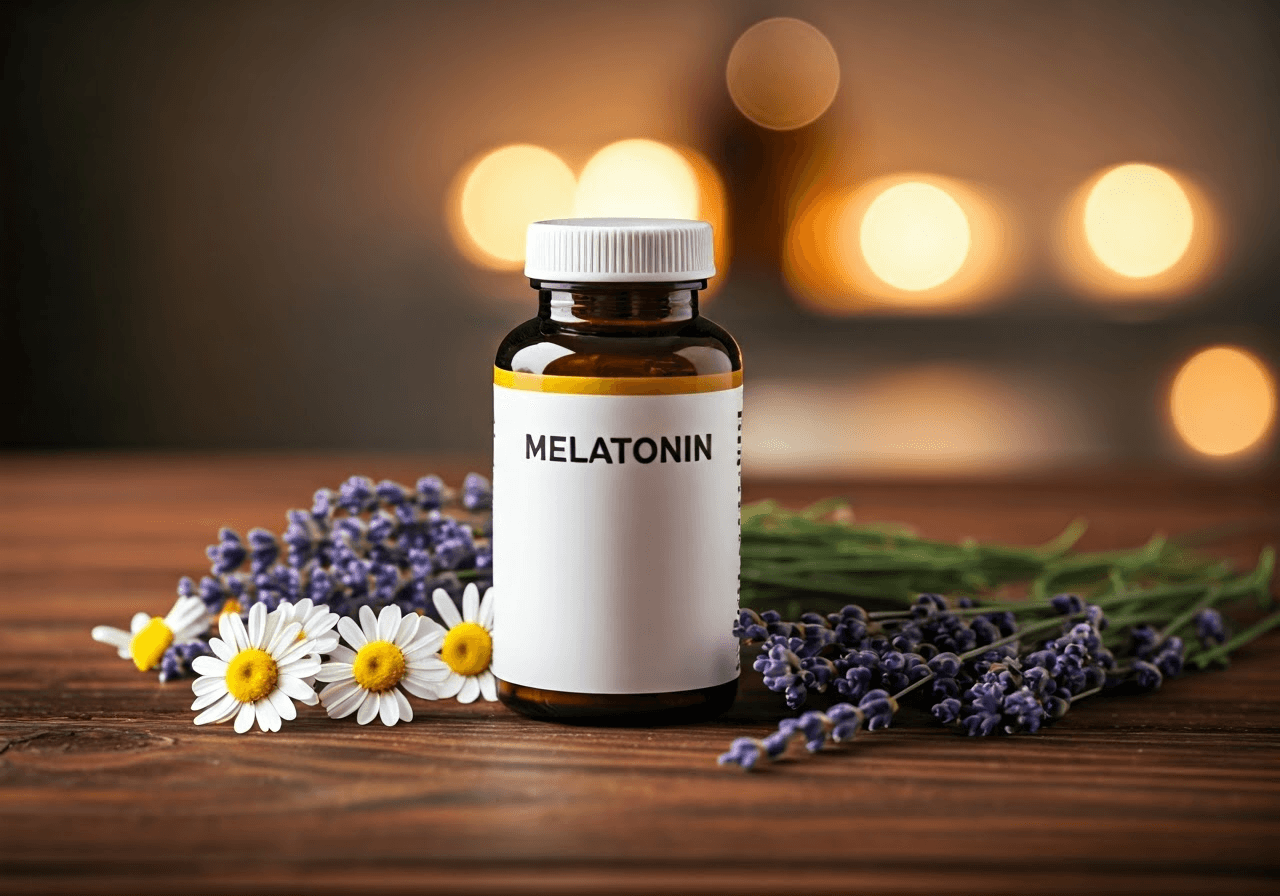
Are you having trouble falling asleep or staying asleep at night? Melatonin is sometimes called the “sleep hormone.” A lot of people use this natural supplement to help with sleep, feel better after jet lag, and get their sleep cycles back on track. In this easy guide, you will learn what melatonin is, how it works, the main benefits, up-to-date findings, safe amounts to take, and good tips for safety — so you can make better choices for your sleep and your health.
What is Melatonin? Definition, Function & How It Works
Melatonin is often called the “hormone of darkness” because it helps regulate our sleep-wake cycle (the circadian rhythm) and plays important roles in overall health. It’s produced in the pineal gland in the brain. As night falls, the body increases melatonin production, signaling that it’s time to sleep and helping us feel relaxed and drowsy.
When morning comes, melatonin levels drop, which helps us wake up. However, things like bright nighttime lights, certain medications, and aging can affect melatonin production, sometimes leading to sleep problems.
How Melatonin Regulates Sleep: Scientific Overview
Melatonin supports sleep by targeting receptors in the brain and central nervous system. It specifically works on the suprachiasmatic nucleus (SCN)—the body’s internal clock—to align our sleep-wake cycle with natural day-night patterns.
When taken as a supplement, melatonin mimics the hormone your body produces, potentially making you feel sleepy. Because of the role of melatonin, many people use it to help with sleep disorders such as insomnia, jet lag, or delayed sleep-wake phase disorder (DSWPD). However, melatonin isn’t a cure-all; results vary based on individual factors and the type of sleep issue. Always consult a healthcare professional for personalized guidance.
Melatonin Health Benefits Beyond Sleep
New research suggests melatonin may offer benefits beyond improving sleep. For example, it may support the immune system due to its antioxidant and anti-inflammatory properties. Researchers are also examining how melatonin affects aging, noting that our bodies produce less melatonin as we grow older. While some believe melatonin supplements could help address age-related issues, more studies are needed to confirm these potential advantages.
Melatonin and Aging: Production, Decline & Effects in Older Adults
Our melatonin levels naturally decrease starting in our 30s, which may contribute to sleep disturbances in older adults and negatively impact their quality of life. Health conditions, medications, and lifestyle factors can further affect melatonin production. That’s why older adults with sleep issues should discuss potential treatments with a healthcare provider, who can weigh the benefits and risks of melatonin supplementation for each individual.
How Melatonin Works in the Body & Brain

Melatonin interacts with our internal circadian clock, which manages the sleep-wake cycle. When you take exogenous melatonin (a supplement), it functions like your body’s own melatonin, boosting overall levels and potentially resetting your circadian rhythm. However, effectiveness varies from person to person, depending on factors like dosage, timing, and individual sensitivity.
How Melatonin Improves Sleep Quality & Duration
For those who struggle with falling asleep or maintaining a regular sleep schedule, melatonin can help reduce sleep latency – the amount of time it takes to drift off. Studies show it’s especially useful for people with circadian rhythm issues like jet lag or shift work disorder, helping the body align its natural sleep-wake cycle more effectively.
Melatonin for Insomnia, Jet Lag & Sleep Disorders
Melatonin isn’t the primary treatment for insomnia, but it can assist with certain sleep disorders, especially those linked to circadian rhythm disruptions, such as delayed sleep phase syndrome. By taking melatonin under a doctor’s guidance, individuals can reset their internal clocks, fall asleep earlier, and experience better sleep quality. It’s also important to consider lifestyle factors, overall sleep hygiene, and seek medical advice for the best results.
Melatonin for Jet Lag & Resetting Circadian Rhythm
Jet lag occurs when we travel across time zones faster than our bodies can adjust, leading to daytime fatigue, nighttime sleeplessness, and various symptoms of jet lag. Melatonin can help by recalibrating our daily rhythm to the new local time – if taken at the correct moment. Shift workers may also benefit, using melatonin to sleep during daylight hours when their bodies are naturally more alert. Proper timing is key to success in both cases.
Natural Sources of Melatonin: Foods That Boost Levels

While melatonin supplements are widely available, you can also boost melatonin naturally by eating foods like tart cherries, walnuts, almonds, pineapples, and tomatoes – though cherries typically have the highest levels. Consuming foods high in tryptophan, such as poultry, eggs, or dairy, can also help the body produce more melatonin on its own.
These foods and nutrients can help increase your body’s natural melatonin levels and support better sleep. Here’s how they work:
| Food Item | Melatonin Role | Key Nutrients/Compounds | Mechanism / How it Helps | Notes / Benefits |
|---|---|---|---|---|
| Tart Cherries | Direct source (high) | Melatonin, Vitamin C, Antioxidants | Provides ready-to-use melatonin; antioxidants support healthy cells | Top natural source, especially tart juice |
| Walnuts | Direct source (moderate) | Melatonin, Tryptophan, Omega-3s | Contains melatonin; tryptophan helps your body make melatonin | Also provides healthy fats, brain support |
| Goji Berries | Direct source (moderate) | Melatonin, Antioxidants | Contains melatonin; antioxidants promote immune and cell health | Supports immunity, rich in vitamins |
| Fatty Fish | Indirect booster | Omega-3s, Vitamin D, Protein | Omega-3s and vitamin D may improve sleep quality and support melatonin production | Great for heart and brain health |
| Milk | Direct (low) + booster | Melatonin, Tryptophan, Calcium | Contains melatonin; tryptophan and calcium help convert tryptophan to melatonin | Calming effect, best consumed before bed |
| Eggs | Direct (trace) + booster | Melatonin, Tryptophan, Vitamin B12 | Trace melatonin; tryptophan supports your body’s melatonin synthesis | High in protein and nutrients |
| Oats | Direct (trace) + booster | Tryptophan, B Vitamins, Magnesium | Tryptophan is used to make melatonin; B vitamins and magnesium are important cofactors | Filling, comforting, ideal for evenings |
| Rice (black/red) | Direct (modest) | Melatonin, B Vitamins, Iron | Contains melatonin (higher in black/red rice); B vitamins aid metabolism | Best to choose black or red rice |
| Bananas | Booster | Tryptophan, Vitamin B6, Magnesium | Tryptophan and B6 help your body naturally produce melatonin; magnesium relaxes muscles | Supports relaxation and sleep |
| Almonds | Booster | Tryptophan, Magnesium, Vitamin E | Tryptophan and magnesium help boost melatonin; vitamin E supports overall health | Promotes sleep and heart health |
| Pineapple | Booster | Vitamin C, Bromelain, Antioxidants | May increase melatonin metabolite levels, improving sleep quality (per studies) | May help boost nighttime melatonin levels |
| Kiwi | Booster | Serotonin, Vitamin C, Antioxidants | Serotonin is a precursor for melatonin; antioxidants may enhance sleep quality | Linked to better sleep in research |
| Pumpkin/Sunflower/Sesame Seeds | Booster | Tryptophan, Magnesium, Zinc | Tryptophan is a precursor for melatonin; magnesium and zinc are required for synthesis | Easy to add for minerals and sleep support |
| Turkey/Chicken | Booster | Tryptophan, Protein | High tryptophan content supports serotonin and melatonin production | Classic source for natural sleep aid |
| Beans/Lentils | Booster | Tryptophan, Magnesium, B Vitamins | Tryptophan, B vitamins, and magnesium help boost natural melatonin | Plant protein, fiber, sleep support |
Melatonin Supplement Types: Pills, Gummies, Tablets & More

Melatonin supplements come in many forms as a dietary supplement. Pills are common for consistent dosing, while gummies offer a more pleasant taste. You can also find liquid melatonin, dissolvable tablets, and even creams that may be applied to the skin. With so many options, it’s best to pick a format that fits your lifestyle and preferences.
The table below compares the most common melatonin supplement forms to help you choose what’s right for you:
| Form | Description | Advantages | Disadvantages | Best For |
|---|---|---|---|---|
| Pills | Capsules or coated tablets; most common form | Easy to dose; widely available | May take longer to absorb than liquids | Consistent daily supplementation |
| Gummies | Chewable, flavored; popular for taste | Tasty and easy to take; some sugar-free | Some contain added sugars or artificial colors | People who dislike swallowing pills |
| Tablets | Hard, pressed powder form | Long shelf life; precise dosage | Can be difficult to swallow for some | Standardized and cost-effective supplements |
| Liquid | Drops or syrup; can be absorbed quickly | Fast-acting; customizable dosage | May require refrigeration after opening; shorter shelf life | Children, or rapid sleep onset needs |
| Sublingual (under tongue) | Dissolves under the tongue; absorbed directly | Rapid absorption into the bloodstream | May have an unpleasant taste | Quick effect before bedtime |
| Extended-release (ER) | Slowly releases melatonin over time | Supports longer, uninterrupted sleep | Less helpful for falling asleep quickly | People who wake up during the night |
| Melatonin Sprays | Spray into the mouth; often flavored | Convenient; absorbs quickly | Higher cost per dose | Travel, on-the-go routines, irregular schedules |
How to Choose the Best Melatonin Supplement
Choosing the best melatonin supplement can be confusing. Here are some tips:
Look for reputable brands: Select products from trusted companies.
Check for third-party testing: Ensure the supplement is safe and effective.
Consider dosage and formulation: Match the dose and type (fast-release, extended-release, etc.) to your needs.
- Ingredient quality: Look for minimal fillers, allergens, and unnecessary additives.
- Intended use: Highlight different needs (e.g., occasional jet lag vs. chronic insomnia).
- Potential interactions: Remind users to check for medication or condition interactions.
- User reviews: Briefly mention checking reviews for effectiveness and side effects
Consulting reliable sources like the Journal of Clinical Sleep Medicine or talking to a healthcare provider can help you make an informed choice.
Melatonin Dosage Guidelines: How Much Should You Take?
Determining the right melatonin dose varies by individual, severity of sleep problems, and overall health. A range between 0.5mg and 10mg is common, but starting low and gradually increasing may be the safest approach. Always seek professional advice before adding melatonin or any new supplement to your routine.
The table below breaks down typical melatonin dosages for different purposes and age groups. Use it as a general guide and always consult your healthcare provider for personalized advice.
| Purpose / Population | Typical Starting Dose | Common Effective Range | Max (consult doctor above this) | When & How to Take | Important Notes / Precautions |
|---|---|---|---|---|---|
| Adults (General Sleep) | 0.5–1 mg | 0.5–5 mg | 10 mg | 30–60 min before bedtime | Start low; higher doses not always more effective; consult doctor if needed |
| Older Adults (65+) | 0.3–1 mg | 0.3–3 mg | 5 mg | 30–60 min before bedtime | Use lowest effective dose; increased sensitivity to effects |
| Children / Teens | Medical supervision | Medical supervision | Medical supervision | 30–60 min before bedtime | ONLY under pediatrician’s guidance; short-term use preferred |
| Jet Lag | 0.5–1 mg | 0.5–5 mg | 5 mg | Evening (destination time zone) | Begin day of travel; take for several days after arrival |
| Shift Work | 1–3 mg | 1–5 mg | 10 mg | 30–60 min before desired sleep | Use for schedule changes; consistency matters |
| DSWPD (Delayed Sleep-Wake) | 0.3–0.5 mg | 0.3–1 mg | 2 mg | 3–6 hours before bedtime | Requires specialist guidance; precise timing is crucial |
| Insomnia (circadian-related) | 1–3 mg | 1–5 mg | 10 mg | 30–60 min before bedtime | Best for circadian rhythm issues; consult healthcare provider |
Note:
Do not exceed the maximum dose listed without consulting a healthcare professional. Higher doses do not always improve results and may increase side effects.
Best Time to Take Melatonin for Sleep & Jet Lag
Timing plays a big role in melatonin’s success. Generally, taking it 30–60 minutes before bedtime aligns best with most people’s circadian rhythm. However, factors like personal sensitivity, supplement type, and your reason for using melatonin (e.g., jet lag, shift work) can influence the ideal schedule. It’s often best to experiment with lower doses and adjust the timing based on how your body responds.
Who Should & Shouldn’t Take Melatonin: Safety Guide

Melatonin is typically safe for short-term use in healthy adults, but anyone with underlying health conditions, those who are pregnant or breastfeeding, or people taking certain medications should talk to a healthcare provider first. Children and older adults should also consult a professional to ensure melatonin is appropriate and to determine the safest dose.
The table below highlights who can safely take melatonin and who should use extra caution or avoid it altogether. Always consult your healthcare provider if you have any doubts or medical conditions.
| Group / Situation | Can Take Melatonin? | Key Considerations / Warnings |
|---|---|---|
| Healthy Adults | Yes (short-term) | Generally safe for short-term use; start with low dose; monitor for side effects |
| Older Adults (65+) | Yes (with caution) | Increased sensitivity; use lowest effective dose; monitor for next-day drowsiness |
| Children & Teens | Only with prescription | Should be used only under pediatrician’s guidance; safety for long-term use unclear |
| Pregnant/Breastfeeding Women | Not recommended | Insufficient safety data; avoid unless prescribed by a doctor |
| People on Certain Medications | With doctor’s advice | Can interact with blood thinners, immunosuppressants, anticonvulsants, diabetes meds, etc. |
| People with Autoimmune Disorders | With doctor’s advice | May affect immune function; consult healthcare provider |
| People with Depression, Mood or Seizure Disorders | With doctor’s advice | Melatonin may affect mood or interact with medications; consult provider |
| Night Shift Workers / Jet Lag | Yes (short-term) | May help adjust sleep cycle; use short-term and follow dosing guidelines |
| People with Severe Allergies | Caution | Some supplements may contain allergens or additives; check labels carefully |
| Individuals with Liver/Kidney Disease | With doctor’s advice | Metabolism of melatonin may be altered; dose adjustment may be necessary |
| People with Sleep Disorders (Insomnia, DSWPD, etc.) | Yes (under guidance) | Often helpful, but best under healthcare provider’s supervision |
Note:
Always consult a healthcare provider before using melatonin in children, teens, pregnancy, breastfeeding, or if you have ongoing medical conditions.
Is Melatonin Safe for Everyone? Precautions & Special Cases
Melatonin is usually well-tolerated, but it can interact with medications like blood thinners, immunosuppressants, or birth control. Individuals with conditions such as diabetes, high blood pressure, or autoimmune disorders should also be cautious about melatonin for blood pressure. In addition, pregnant or breastfeeding women should avoid melatonin unless advised otherwise by a doctor, since research on its effects in these situations is limited.
The table below highlights special cases and common conditions where extra caution with melatonin is needed. Always check with your healthcare provider if you have any concerns.
| Group / Condition | Precaution / Risk | What to Do |
|---|---|---|
| Taking Blood Thinners (e.g., warfarin) | May increase bleeding risk | Consult your doctor before using melatonin |
| On Immunosuppressants | Potential interaction; may alter immune response | Medical supervision required |
| Taking Birth Control | May alter hormone levels or reduce effectiveness | Talk to your healthcare provider |
| Diabetes or Blood Sugar Disorders | Can affect glucose regulation | Monitor blood sugar; consult your doctor |
| High Blood Pressure (Hypertension) | May interact with medications; may lower blood pressure | Use with caution; discuss with your provider |
| Autoimmune Disorders | May stimulate immune system | Only use under medical advice |
| Pregnant or Breastfeeding | Safety not established; potential unknown risks | Avoid unless prescribed by your doctor |
| Chronic Health Conditions | Various potential interactions | Always consult your healthcare provider |
| Children and Teens | Safety not established for long-term use | Use only under pediatrician supervision |
| Taking Other Regular Medications | Potential for interactions | Check with a healthcare provider before use |
Melatonin Safety, Precautions & Drug Interactions

Always follow recommended dosage guidelines and let your healthcare provider know about any other supplements or medications you’re taking. Although melatonin is considered safe for short-term use, it can cause mild side effects of melatonin like daytime drowsiness, headaches, or dizziness. If these persist or worsen, consult your doctor.
Melatonin Side Effects: What to Expect
Most people who experience side effects report mild issues that often subside with continued use or dosage adjustments. These can include:
Daytime sleepiness
Headaches
Dizziness
Nausea
If side effects are long-lasting or disruptive, speak with a medical professional about adjusting your dose or exploring other sleep aids.
The table below summarizes common and rare side effects of melatonin, how often they occur, and what you can do if they appear.
| Side Effect / Category | What to Expect / Description | How Common? | Severity | Management / When to Be Concerned |
|---|---|---|---|---|
| Daytime Drowsiness/Grogginess | Feeling sleepy or “hangover” effect the next day | Common (dose-related) | Mild | Lower dose; ensure 7–8 hours sleep; avoid driving if affected |
| Headache | Mild to moderate headache | Common | Mild | Usually resolves; stop use and consult doctor if persistent or severe |
| Dizziness/Lightheadedness | Feeling unsteady or lightheaded | Less common | Mild–moderate | Be careful standing; stop use if persistent/severe or if falls occur |
| Nausea / Stomach Upset | Mild stomach discomfort, queasiness | Less common | Mild–moderate | Try with light snack; stop if persistent or severe |
| Vivid Dreams / Nightmares | More intense, memorable, or unsettling dreams | Occasional | Mild | Lower dose if bothersome; usually resolves on its own |
| Mood Changes (Irritability, Low Mood, Anxiety) | Temporary mild changes in mood, sadness, anxiety | Rare | Mild–moderate | Monitor mood; discontinue if persistent or worsening |
| Short-term Depression-like Symptoms | Temporary increase in low mood | Rare | Mild–moderate | Stop use and consult provider if symptoms develop |
| Reduced Alertness | Difficulty staying alert even if not overtly drowsy | Less common | Mild | Avoid activities requiring focus until you know your response |
| Stomach Cramps/Diarrhea | Mild GI discomfort beyond nausea | Rare | Mild | Usually resolves; stop if severe/persistent |
| Hormonal Effects | Changes in menstrual cycle, etc. | Rare | Mild–moderate | See doctor if unusual changes occur |
| Blood Pressure or Blood Sugar Changes | May lower/raise blood pressure or affect glucose | Rare | Mild | Monitor if you have these conditions; consult doctor if needed |
| Allergic Reaction | Rash, hives, swelling, severe dizziness, trouble breathing | Very rare | Severe | Stop use immediately; seek emergency help |
Long-term Melatonin Safety & Potential Risks
Because there isn’t much research on long-term, high-dose melatonin use, its extended safety profile isn’t fully understood. Frequent, high-dose use might disrupt your body’s natural melatonin production, leading to potential dependency or reduced effectiveness. If you’re considering long-term use, talk to a healthcare provider to weigh benefits and risks.
Melatonin Drug Interactions & Contraindications
Melatonin can interact with certain prescription medications—especially blood thinners, immunosuppressants, and drugs metabolized by the liver. It can increase or decrease the effectiveness of these medications, potentially leading to an increased risk of seizures and unintended side effects. Always inform your healthcare provider about all the medications and supplements you’re taking to ensure safe and effective melatonin use.
The table below highlights the most important drug interactions and risks to consider before using melatonin.
| Medication / Condition | Potential Interaction or Risk | Symptoms or Signs to Watch For | What to Do / Precaution |
|---|---|---|---|
| Blood Thinners | May increase risk of bleeding or affect drug effectiveness | Unusual bruising, prolonged bleeding, nosebleeds | Consult your healthcare provider before use |
| Immunosuppressants | May decrease effectiveness or alter immune response | Frequent infections, fever, slow wound healing | Use only with medical supervision |
| Antihypertensive Drugs | May further lower blood pressure, increase risk of hypotension | Dizziness, fainting, unusually low blood pressure | Monitor blood pressure; consult your provider |
| Diabetes Medications | May affect blood sugar control, increase risk of hypoglycemia or hyperglycemia | Unusual sweating, shakiness, confusion, changes in blood sugar levels | Check your blood sugar regularly; consult your doctor |
| Drugs Metabolized by the Liver (e.g., statins, anticonvulsants, antibiotics) | Can increase or decrease drug levels, raising risk of side effects or reduced efficacy | Unusual side effects from medications, changes in drug effectiveness | Discuss all medications and supplements with your healthcare provider |
| Seizure Medications | May increase risk of seizures | New or increased seizure activity | Use only under close medical supervision |
| Sedatives / CNS Depressants (e.g., benzodiazepines, sleep meds, alcohol) | May increase drowsiness, risk of excessive sedation or slowed reflexes | Excessive sleepiness, confusion, impaired coordination | Use together only if prescribed; avoid combining with alcohol; monitor closely |
| Antidepressants (SSRIs, SNRIs, TCAs) | Possible additive sedative effects or mood changes | Unusual drowsiness, mood swings, confusion | Talk to your mental health provider before using together |
| Any Prescription Medication | Possible interaction; may affect safety or effectiveness | Unexpected side effects or lack of medication effect | Always inform your healthcare provider before starting melatonin |
Abbreviations Used:
SSRIs: Selective Serotonin Reuptake Inhibitors
SNRIs: Serotonin-Norepinephrine Reuptake Inhibitors
TCAs: Tricyclic Antidepressants
CNS: Central Nervous System
Melatonin Overdose: Symptoms, Risks & What to Do
Signs of a melatonin overdose can include extreme drowsiness, dizziness, or nausea. Severe cases might involve hallucinations or a rapid heartbeat. If you suspect an overdose, contact a medical professional immediately, mention the amount of melatonin taken, and avoid further doses until you receive advice.
The table below outlines the most common symptoms, risks, and actions to take in case of a melatonin overdose.
| Symptom / Risk | How Common? | Severity | What to Do | When to Seek Medical Help |
|---|---|---|---|---|
| Extreme daytime drowsiness | Common (high dose) | Usually mild–moderate | Lower the dose; avoid driving or dangerous activities | If it persists or affects daily functioning |
| Headache | Occasional | Usually mild | Hydrate, rest, reduce dose | If severe or does not improve |
| Nausea or stomach upset | Occasional | Mild–moderate | Take with food; lower dose | If vomiting is severe or persistent |
| Dizziness or lightheadedness | Less common | Mild–moderate | Sit or lie down until it passes; lower dose next time | If severe or leads to fainting |
| Confusion, disorientation | Rare (high dose) | Moderate–severe | Stop melatonin; rest | If confusion is severe or persistent |
| Vivid dreams or nightmares | Sometimes | Mild | Lower dose; usually resolves on its own | If persistent and distressing |
| Rapid heartbeat (palpitations) | Rare | Can be serious | Stop use immediately | If strong, irregular, with chest pain, or persistent |
| Hallucinations | Very rare | Serious | Stop use; have someone stay with the person | Seek emergency care immediately |
| Shortness of breath | Very rare | Serious | Stop use; sit upright | Seek emergency care |
| Seizures | Extremely rare | Life-threatening | Stop use; ensure safety (prevent injury) | Call emergency services immediately |
Melatonin Myths & Facts: What You Should Know

Despite its popularity, melatonin still faces misconceptions. One myth is that melatonin is addictive or leads to dependence, but it isn’t habit-forming, and you won’t experience withdrawal if you stop. Another myth is that melatonin guarantees perfect sleep for everyone, yet it’s just one tool among many for improving rest. Good sleep habits are still essential.
Melatonin and Dependency: Is It Addictive?
Melatonin doesn’t typically cause dependency, unlike some prescription sleep aids. It works by syncing the body’s internal clock with the natural light-dark cycle. While research on long-term use is ongoing, current findings suggest melatonin poses little risk of dependency when used responsibly under medical guidance.
Melatonin Effects on the Body: Facts vs Fiction
Though often seen as a sleep supplement, melatonin also helps regulate other bodily functions like immune support, hormone balance, and antioxidant defense. A deeper look at studies and systematic reviews can clarify what melatonin can truly achieve versus unproven claims.
The table below separates science-backed melatonin effects from common myths and misconceptions.
| Claim / Effect | Fact or Fiction? | What the Science Says | Practical Takeaway |
|---|---|---|---|
| Melatonin is a natural sleep hormone | Fact | Melatonin is produced by the pineal gland and regulates sleep-wake cycles | It’s a real hormone essential for circadian rhythm |
| Melatonin supplements are a cure-all for insomnia | Fiction | Helpful for circadian-related sleep issues; not effective for all insomnia | Best for jet lag, shift work, delayed sleep phase—not all cases |
| Melatonin is addictive | Fiction | Not habit-forming, does not cause withdrawal or dependence | Safe for most users, even with regular short-term use |
| Higher doses of melatonin improve sleep | Fiction | Research shows lower doses are often as effective as high doses | Start low; more isn’t always better |
| Melatonin can help with jet lag and shift work sleep | Fact | Proven to help reset circadian rhythm and ease transition to new sleep times | Effective for travel and irregular schedules |
| Melatonin boosts immune function | Partly Fact | Some evidence of immune-modulating and antioxidant effects, but modest; not proven for preventing illness | May support immunity, but not a replacement for healthy habits |
| Melatonin is safe for children without medical advice | Fiction | Safety for long-term or high-dose use in kids is not established | Only use for children with pediatric guidance |
| Melatonin treats depression and anxiety | Unproven | Early research is ongoing; not an approved or primary treatment | Don’t use as a substitute for mental health care |
| Melatonin interacts with some medications | Fact | Can interact with blood thinners, immunosuppressants, diabetes drugs, etc. | Always consult a healthcare provider if on regular medication |
| Melatonin production declines with age | Fact | The body makes less melatonin as we get older | May contribute to sleep issues in older adults |
| Melatonin is safe for long-term use in adults | Unproven | Most studies cover short-term use; long-term safety data is limited | Use lowest effective dose; discuss with your healthcare provider |
Latest Research: Melatonin Health Benefits & Uses

Recent studies highlight melatonin’s potential roles in immune function, mood regulation, and even cancer treatment. While these findings are promising, much of the data is preliminary. Further research could lead to new ways of using melatonin for various health concerns.
Melatonin and Immune Function: Role in Disease Prevention
Because melatonin has antioxidant and anti-inflammatory properties, scientists believe it might help regulate immune responses. By reducing free radicals, melatonin could protect cells from damage that can lead to chronic conditions like heart disease, cancer, and neurological issues. More research is needed to determine the best doses and applications.
Melatonin and Mental Health: Depression, Anxiety & Mood
Melatonin may also benefit mental health. Researchers are exploring its potential impact on melatonin and depression, and anxiety, noting the strong connection between sleep, circadian rhythms, and emotional well-being. While early findings are encouraging, larger clinical trials are needed to confirm how melatonin could be used in mental health treatments.
Tips to Maximize Melatonin Benefits for Sleep

Melatonin alone won’t fix every sleep problem. Pairing it with healthy lifestyle changes and other natural sleep aids can maximize results. Sticking to a consistent bedtime, keeping your room dark and cool, limiting screen time before bed, and adding relaxation techniques can all enhance melatonin’s effectiveness.
Lifestyle Tips to Enhance Melatonin’s Sleep Effects
Establish a steady sleep schedule—even on weekends—to help your body’s internal clock stay consistent. Develop a calming bedtime routine by taking a warm bath, reading, or listening to soothing music. Avoid bright lights, especially blue light from screens, for at least an hour before bedtime. Regular exercise also promotes better sleep, but avoid intense workouts too close to lights-out.
Melatonin & Natural Sleep Aids: Best Combinations
For an even better night’s rest, consider chamomile tea, valerian root, or lavender alongside melatonin. Mindfulness techniques, such as meditation or deep breathing, can also calm your mind and reduce stress. Make sure your bedroom is set up for quality sleep—quiet, cool, and comfortable. Using melatonin with these strategies can lead to more natural and restorative rest.
Conclusion
Melatonin is a natural option for improving sleep and supporting overall health. It can help with sleep disorders and may offer immune system benefits. To get the most out of melatonin, choose the right type and dosage, and stay mindful of potential interactions and side effects. Understanding the facts and myths around melatonin empowers you to make smart decisions about your sleep and well-being. Combine healthy habits, natural sleep aids, and melatonin to enjoy a more restful night and better overall health.
The content on WellwayHub.com is intended for general informational purposes only and should not be taken as medical advice. Please consult your doctor or a qualified health professional before making any changes to your health routine.
Some links on WellwayHub.com may be affiliate links. This means we may earn a small commission if you make a purchase through these links, at no extra cost to you. This helps support our mission to provide trusted wellness content.
Frequently Asked Questions
For many people, taking melatonin 30 minutes to an hour before going to bed works best. This timing helps the melatonin dosage match the natural sleep-wake cycle. As seen in clinical practice, this can improve how well it helps people fall asleep.
A melatonin supplement takes different times to work for different people. However, many feel its effects within 30 minutes to an hour. Melatonin helps with sleep latency, slowly making you relaxed and sleepy instead of making you fall asleep right away.
Melatonin for children must be used only with the advice of a health care provider. It might be suitable for certain sleep disturbances in kids who have conditions like autism spectrum disorder. , highlighting the effectiveness of melatonin. However, the safety of melatonin in children needs close evaluation.
Melatonin supplements can affect how other medicines work. This may cause negative side effects. It is important to talk to your health care provider before taking melatonin. This is especially true if you are already using other medications. Your provider can help you understand possible drug interactions.
Yes, a melatonin overdose can happen, especially in kids. Symptoms can include feeling sleepy and dizzy, but it can also lead to more serious issues. If you think someone has taken too much, get emergency medical help right away.
Some people may notice changes in their dreams when using melatonin. While not everyone will, some individuals have reported having more vivid dreams or nightmares. This might happen because melatonin affects REM sleep.
Research on the effects of melatonin supplements is not very extensive. It is usually thought to be safe for short-term use of melatonin supplements. However, to understand the safety of melatonin for a longer time, we need more randomized controlled trials.
Research on how safe melatonin is over the long term is still unclear. A systematic review shows it is usually well-tolerated. However, it is important to talk to your health care provider before using it for a long time. This can help you check for possible risks and melatonin side effects.